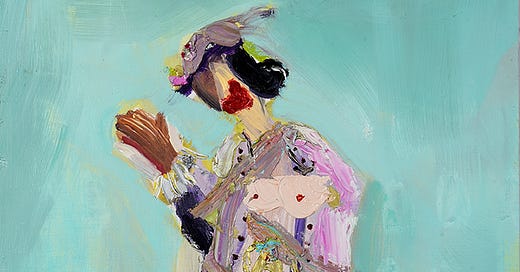#466: The Feminist
Articles on dateless feminist men, succumbing to evil, and misguided views on reading
Dear Readers,
Thank you for your kind words and thoughtful comments about last week’s issue. My intent was not to disparage the author but rather to highlight the piece’s weaknesses in argumentation. Several of you said you appreciated seeing how I read and annotate. No promises, but maybe I’ll do this again in an upcoming issue — that is to say, if a piece moves me so.
This week, let’s get back to classic Article Club — in which I scour the Internet and bring you four great articles, from a variety of publications, on race, education, and culture. Today’s lead piece is a short story, “The Feminist,“ by Tony Tulathimutte. Honestly, I’ve never read anything quite like it. In short, the story is about a white man with feminist politics who wonders why he can’t find a woman to date. My feelings while reading the piece ran the gamut. When should my compassion for the main character begin and end? What’s the line between cluelessness and creepiness?
If you’d like to steer clear of anything resembling incel energy, I’ve included three other pieces for you in this week’s issue. They are about:
a Black man who lashes out at a white police officer after finding out that he has cancer
two additional perspectives (here and here) on last week’s Atlantic article on reading
Hope you enjoy this week’s articles. As always, if a piece hits you, let me know. I’d love to hear from you. Or if you prefer, show your support by becoming a paid subscriber (like Frances!). I would be very grateful.
1️⃣ The Feminist
Tony Tulathimutte: “If you ask him where he went to high school, he likes to boast that, actually, he went to an all-girls school. That was sort of true — he was one of five males at a progressive private school that had gone co-ed just before he’d enrolled. People always reply: Ooh la la, lucky guy! You must’ve had your pick. Which irritates him, because it implied women would only date him if there were no other options, and because he hadn’t dated anyone in high school. One classmate junior year had a crush on him, but he wasn’t attracted to her curvaceous body type so felt justified in rejecting her, just as he’d been rejected many times himself.
“The women he tries to date offer him friendship instead, so once again, most of his friends are women. This is fine: it’s their prerogative, and anyway, lots of relationships begin platonically — especially for guys with narrow shoulders. But soon a pattern emerges. The first time, as he is leaving his friend’s dorm room, he surprises himself by saying: Hey, this might be super random, and she can totally say no, but he’s attracted to her, so did she want to go on a ‘date’ date, sometime? In a casual and normal voice. And she says, ‘Oh,’ and filibusters — she had no idea he felt that way, and she doesn’t want to risk spoiling the good thing they have by making it a thing, she just wants to stay . . . and he rushes to assure her that it’s valid, no, totally valid, he knows friendship isn’t a downgrade, sorry for being weird. Ugh!
“Right? she replies, dating’s so overrated and meaningless in college anyway, and she knows that he knows he’ll find someone who deserves him, because he’s great, really great, so thoughtful, so smart, not like these SAE sideways-hat-wearing dudebros, but of course he already knows that, and she really appreciates it. Then he thanks her for being honest, because it’s proof their friendship is real, and don’t worry about him, he gets it.”
By Tony Tulathimutte • n + 1 • 29 min • Gift Link
✚ Check out this recent profile of Mr. Tulathimutte in The New York Times. It also discusses his new book, Rejection, a collection of seven connected short stories.
💬 Your Turn: What do you think?
What did you think of this guy? What did you think of this piece?
I’d love to hear your thoughts and get a conversation going in the comments.
➡️ Did you have compassion for the main character? Or, like me, did you draw a line?
➡️ Did you find the main character clueless or creepy, or something else?
In typical Article Club fashon, be sure to be kind and thoughtful!

2️⃣ Letter From Home
Kiese Laymon: “I do not want to disappoint God, Mississippi, or home with this letter, but I have to disappoint God, Mississippi, and home with this letter. I am currently succumbing to evil.
“I refuse to believe that the height of human being, which is really the act and art of being human, in this nation, is our capacity to kill, to incarcerate, to systemically humiliate, to discipline or to own people most efficiently. I believe that the height of human being in Mississippi, in New York, in Gaza, in Israel, in Sudan, everywhere on Earth, can be our ability to atone, restore, share, and vigorously accept when we have succumbed to evil.”
By Kiese Laymon • Bitter Southerner • 6 min • Gift Link
3️⃣ They didn’t like The Atlantic article on reading, either
Turns out, it wasn’t just me who disliked The Atlantic’s viral article on reading, which lamented that elite college students have difficulty finishing books. By the looks of last week’s comments section, several of you didn’t much like it, either.
Big thanks to loyal readers Caroline, Debra, and Knitwish, who sent these thoughtful pieces my way. The first is by an English teacher interviewed for the piece. The second is a well-written rant with analysis similar to mine.
The Atlantic Did Me Dirty
By Carrie M. Santo-Thomas • Personal Substack • 9 min • Gift Link
Carrie M. Santo-Thomas: “[Rose] Horowitch’s article reflects a frighteningly narrow definition of what constitutes worthwhile literature. Passing references to Moby Dick, Crime and Punishment, and even my unit about The Odyssey, confine literary merit to a very small, very old, very white, and very male box. As a staunch advocate for diverse and representative literature, I was immediately curious about the actual texts at the center of this ‘crisis’ so I asked Horowitch directly what types of books were the sticking points in her professor friends’ curricula. Unsurprisingly, it was canonical classics. As Horowitch points out, I am just ’one public-high school teacher in Illinois,’ but while professors at elite universities sound the alarm over Gen Z undergrads not finishing Les Miserables because they are uninterested in reading a pompous French man drone on for chapters about the Paris sewer system, my colleagues and I have developed professional toolboxes with endless other ways to inspire our students to read about justice, compassion, and redemption.”
Rose Horowitch And The Obsession With Belief Over Empiricism
By Chad Post • Three Percent • 6 min • Gift Link
Chad Post: “This argument is a perfect exemplar of today’s op-ed obsessed content economy: Is it true? WHO KNOWS! But does it sound plausible? Does it give you something to rail against? FOR SURE. It’s Thanksgiving dinner fodder: ‘Kids sure are dumb these days. They can’t even read all of Crime and Punishment!’ (‘Generally, they only read “Crime” ‘ is the most appropriate response.)"
“I do want to point out that NOT A SINGLE STUDENT was interviewed for this piece. Instead, it’s all anecdotal stuff that professors would say at a cocktail party for laughs and so that everyone could commiserate over how ‘teaching is so much harder now, because students are dumber.’ ”
Thank you for reading this week’s issue. Hope you liked it. 😀
To our 5 new subscribers — including Cassie, Kaiti, Jordan, and Sara — I hope you find the newsletter a solid addition to your email inbox. Welcome to Article Club. Make yourself at home.
If you appreciate the articles, value our discussions, and in general have come to trust that Article Club will have better things for you to read than your current habit of scrolling the Internet for hours on end, please consider a paid subscription. I am very appreciative of Quince, our latest paid reader. Thank you!
If subscribing is not your thing, don’t despair: There are other ways you can support this newsletter. Recommend the newsletter to a friend (thanks Mindy!), leave a comment, buy me a coffee, or send me an email. I’d love to hear from you.
On the other hand, if you no longer want to receive this newsletter, please feel free to unsubscribe below. See you next Thursday at 9:10 am PT.







In The Feminist our main character struck me as someone with a mental illness who fails to get treatment and goes downhill. The story read like a tragedy and I felt sorry for this guy even though he changes in such a negative way. What I found interesting was the way he used the vocabulary of empathy and sensitivity while objectifying people around him. Is that what conservatives call "virtue signalling?" By the end of the story I felt disturbed and sad.
Re: The Feminist—I did have compassion for this guy, it's the nature of reading fiction I always go in on the narrator's side. But as the story went on I found him to be kind of a caricature more than an actual character. He checks off every basic assumption one could make about an incel, and there's nothing else going on in his life. He's only ever shown scheming about getting sex. It's a short story so it makes sense to keep it tight but with that it loses nuance and he just doesn't seem real. So of course I lost compassion for him and found him to be one-note by the end (although it was jarring to read the last sentence!).